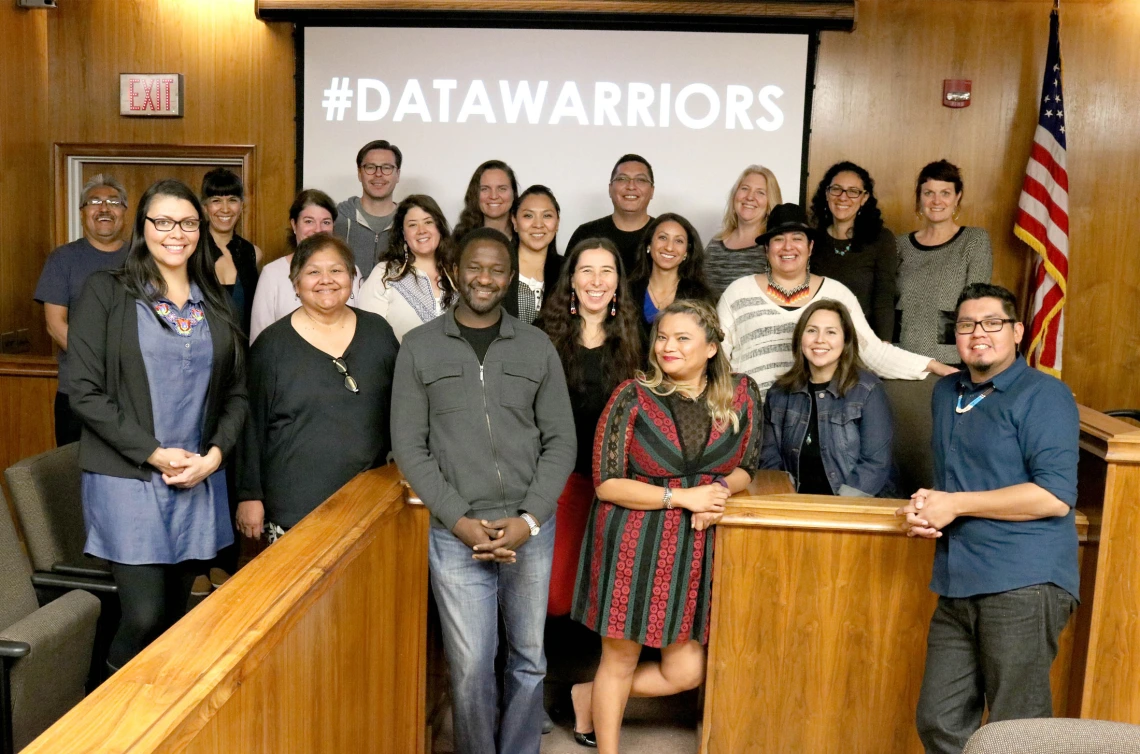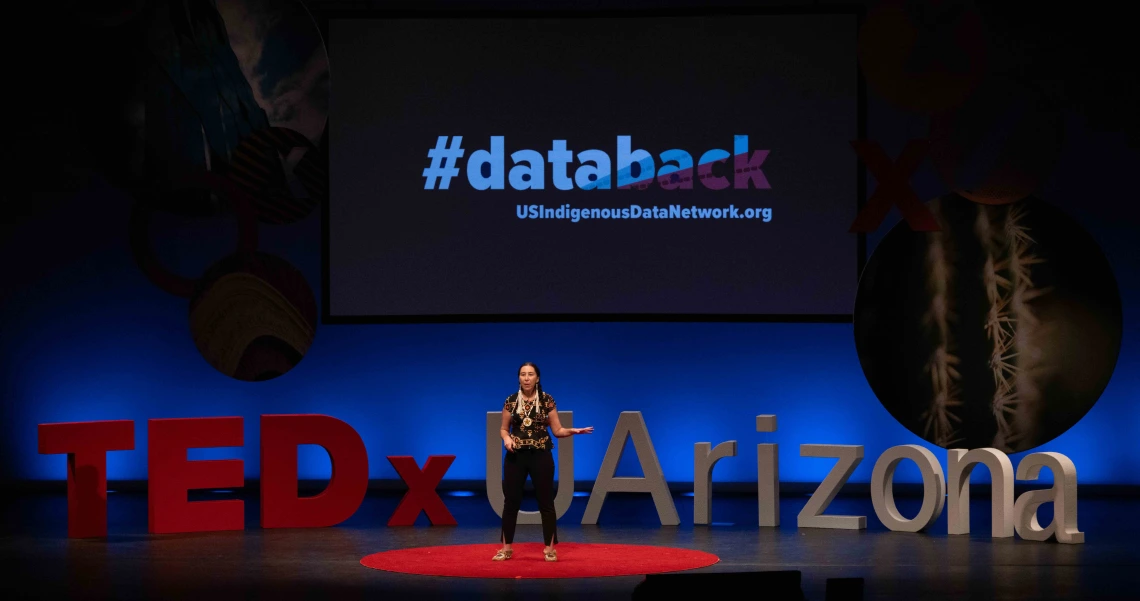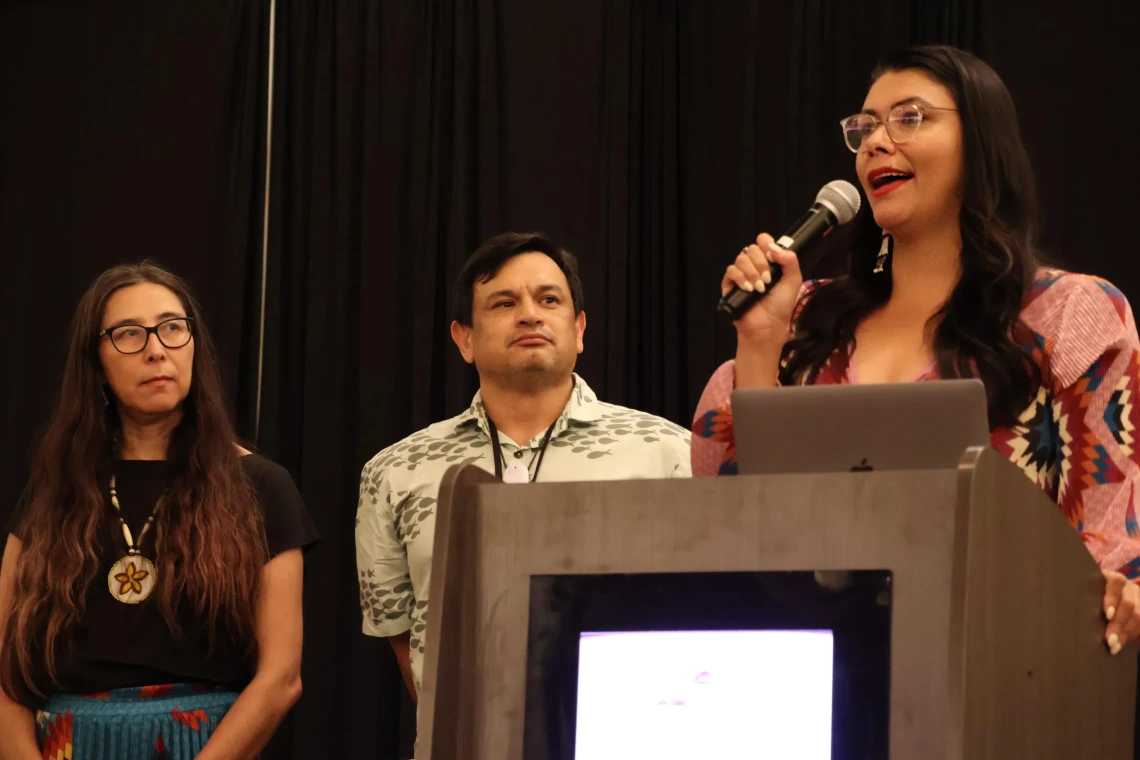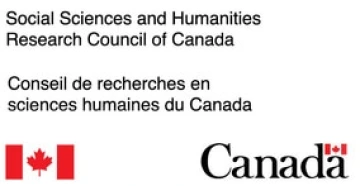U of A, NYU and Harvard experts lead process to codify world’s first global standard on Indigenous Peoples’ data
The standard, which advises scientists and professionals how to record provenance for data about and from Indigenous Peoples’ nations, communities and territories, is the first of its kind and takes effect during Native American Heritage Month in the US.

The planning team for the 2024 IDSov & Gov Summit in Tucson featured Randy Akee (far left, back row) and Stephanie Russo Carroll (far right, front row).
A new standard – developed in partnership with leading Indigenous data sovereignty experts at the University of Arizona, New York University, Harvard University and multiple international universities – outlines how scientists and technology professionals across an array of fields should record the provenance – or origin and history of use – for data about and relating to Indigenous Peoples.
The Institute of Electrical and Electronics Engineers – known as IEEE and dubbed the “world’s largest technical professional organization”– voted and approved the first-ever international standard regarding the “appropriate disclosure of Indigenous peoples’ relationships and/or links to all data,” which was published this month.
The standard details the process for describing and recording the provenance of data about or related to Indigenous Peoples and their cultures, lands and knowledge systems. This includes historical collections of Indigenous data, as well as any future data and datasets coming from Indigenous Peoples and/or deriving from Indigenous lands and waters. The development of IEEE Standards are overseen by the IEEE Standards Association while the content of those standards is “determined by a consensus body of materially interested parties,” according to the organization.
IEEE maintains an archive of over 1000 active technology standards, with several hundred others in development at any given time. These standards are used by researchers and industry professionals in more than 160 countries to develop emerging tech products and processes, impacting everything from the smartphone in your pocket, to generative artificial intelligence, to the infrastructure that powers your community.
The “first step” toward enshrining Indigenous data rights in policy

The movement gaining momentum: faculty & students during the Indigenous Governance Program's January in Tucson 2017 course "Indigenous Data Sovereignty" at the James E. Rogers College of Law
Stephanie Russo Carroll, associate professor in the Mel & Enid Zuckerman College of Public Health, has been on the forefront of the Indigenous data sovereignty movement for the past decade. IDSov, as the concept is often called, asserts that Indigenous Peoples have the sovereign right to control the collection, application and use of data about their citizens, lands and cultures.
Carroll, who is a Dene/Ahtna public health scholar and citizen of the Native Village of Kluti-Kaah in Alaska, served as the chair of the Indigenous Data Working Group responsible for creating the new standard.
Carroll explains that, while the publication of the standard is a preliminary development in the effort to ensure that Indigenous rightsholders maintain control over how and by whom their data are used (the primary purview of IDSov), the publication of a standardized process for documenting the proper provenance for Indigenous Peoples’ data is a critical first step in the right direction for Indigenous Peoples and the scholars seeking to engage in ethical research with them.
“Provenance details the history of a particular set of data,” said Carroll, who is also an associate research professor at the University of Arizona Udall Center for Studies in Public Policy. “It tells you where it originated from. It should also tell you how it's moved over time and how it's potentially changed over time.”
Not only is such background information important for sharing the potential benefits of research with Indigenous communities, Carroll says it’s also crucial to creating possibilities for Native communities to benefit from data and research relationships, in general. “Provenance is the first step in making sure that relationships are embedded in the digital infrastructure so that Indigenous Peoples can govern the use, storage, and distribution of data that are rightfully theirs,” Carroll said.
Cultural literacy and responsible data stewardship

Stephanie Russo Carroll presenting during TEDx at the University of Arizona
New York University Associate Professor and Indigenous Data Working Group Vice Chair Jane Anderson has created practical mechanisms that directly address the cultural impacts of intellectual property and copyright laws. Anderson is the co-founder of Local Contexts – a data labelling tool serving communities, institutions and researchers worldwide to provide clear provenance, protocols and permissions for Indigenous data. While working for Indigenous-serving organizations in Australia in the early-to-mid 2000s, Anderson said they found their way into IDSov work as a result of seeing how “the law radically failed Indigenous communities” by allowing non-Indigenous people to become “the owners of Indigenous culture.”
“I was able to see firsthand the legacy of having non-Indigenous people become the copyright holders of the photographs, the films, the sound recordings, the language materials, the ethnographic texts of Indigenous Peoples. When the copyright holder is the name that is in the record and the one that is remembered, then we are also able to see more clearly the role of the law in furthering non-Indigenous authorship, rights fields and projects of erasure,” Anderson says, adding that, “Poor provenance records for Indigenous collections are a by-product of the law's inherent incapacity to serve Indigenous interests.”
But giving “credit” to Indigenous Peoples and individuals who contribute to a project isn’t the only reason for standardizing the documentation of Indigenous data provenance – it’s also about making sure that data is being interpreted correctly, which is a matter of cultural literacy, said Camille Callison, a Tahltan Nation member and Indigenous caucus chair for the working group.
“Essentially, we're trying to direct people back to the communities who own the knowledge to be able to work with them,” said Callison, who is chair of the National Indigenous Knowledge and Language Alliance and university librarian at the University of the Fraser Valley located in British Columbia, Canada.
She points out that Indigenous Peoples have always actively stewarded information about their cultures, lands, and both human and non-human relatives in a variety of forms that are often freely accessible but sometimes only accessible by those with direct connections to the community. “That's critical because that is part of our literacy… if you don't understand its relationality or if you aren’t literate with other people's knowledge, it is difficult to understand the deeper layers of embedded meaning,” Callison says.
Better data, better outcomes

From left: Stephanie Russo Carroll, Randy Akee, and Desi Small-Rodriguez of UCLA.
Randy Akee is the director of the Harvard Project on Indigenous Governance and Development at the Harvard Kennedy School (a sister organization to the Udall Center’s Native Nations Institute). Akee, who is of Native Hawaiian descent, was secretary of the working group and chair of a subgroup focused on the standard’s scope and purpose. He says the new standard creates benefits for both Indigenous Peoples and researchers.
“Ultimately, the hope is that Indigenous data are used in a respectful, ethical manner,” Akee said. But, knowing that there are protections in place with respect to how those data may be used later could make Indigenous subjects less wary of researchers and more willing to participate in their projects. “It's this idea of creating incentives on both sides so that there's better data and, ultimately, better outcomes,” he said.
Importantly, the new standard does not just address research data, but the wide range of contexts where Indigenous data is collected and used. The new standard also includes the definition of “data actors” to include non-human entities like devices, applications, systems and organizations as well as humans. Now that data are increasingly being used to train non-human entities like generative artificial intelligence engines, the new IEEE standard is the first to ascribe responsibility for how those entities steward that data – including recording provenance – to the humans in charge.
“This is where we started to use the term ‘data actors’ to acknowledge that it’s not just people,” Carroll said. “Some data actors are obviously machines and algorithms today, but ultimately people are responsible.”
Though users typically pay to access IEEE standards, the new IDSov standard will be available for free to anyone interested in referencing or implementing the guidance for at least the first year after publication. This open access is possible via funding channeled through projects shared between Carroll and Memorial University of Newfoundland Professor Max Liboiron. Those projects are based at Memorial University and funded by the Social Science and Humanities Research Council of Canada.
Liboiron, who is Red River Métis and co-director of the IndigeLab Network with Carroll, said providing the standard for free is “essential” to ensuring the content is “accessible to the widest range of users and contexts possible.”
“In the absence of policies enshrining IDSov at research institutions and at the nation-state level in the US, and with other nation-states, institutions and individuals actively seeking guidance, having a standard like this in place is key to protecting the data rights of Indigenous Peoples,” said Carroll. “This not only gives Indigenous Peoples and Native nations something to point to when it comes to asserting their data rights, but this standard will also provide a scaffolding on which to build such policies at all levels in the future.”
Image

| Image

|
###
The views expressed in this article may not represent a position of IEEE or IEEE SA.
IEEE Standards Association (IEEE SA) is a global standards development organization (SDO) that welcomes communities with expertise worldwide to create standards that support their interests. While IEEE SA oversees the process, the content of its standards is determined by a consensus body of materially interested parties.
Media contact:
Craig Baker
Udall Center for Studies in Public Policy
csbaker@arizona.edu
Researcher contact:
Stephanie Russo Carroll
Mel and Enid Zuckerman College of Public Health
Udall Center for Studies in Public Policy
stephaniecarroll@arizona.edu

